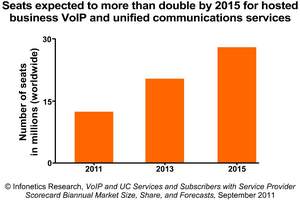A report released at the end of 2012 seemed to point towards a very promising future for mobile VoIP, which is, roughly speaking, nothing more than VoIP services run on smartphones and tablets through apps like the one offered by Skype or Google Voice. The report was released by Juniper Research and it projected the mobile VoIP world would chalk up 1 billion total subscribers by 2017. This is a bold projection, one that seems to indicate VoIP is the future of mobile telephony, but many experts read the report and asked a simple question- “How many of those users will actually generate revenue for mobile VoIP provider?”
VoIP
Are Patent Wars Impacting the IP Telephony Market?
 Apple and Samsung have been locked in legal battles for years, largely over patents related to smartphones. To perhaps oversimplify the matter Apple has been arguing that Samsung has wholesale ripped off the iPhone’s design from day one, and Samsung is countersuing on points of design minutiae that the Korean company argues Apple has stolen. While it seems obvious at first that Apple has the upper hand here, that just about every smartphone is guilty of ripping off the iPhone, when it comes down to it patent law is extremely granular and both sides have support and detraction from their legal claims.
Apple and Samsung have been locked in legal battles for years, largely over patents related to smartphones. To perhaps oversimplify the matter Apple has been arguing that Samsung has wholesale ripped off the iPhone’s design from day one, and Samsung is countersuing on points of design minutiae that the Korean company argues Apple has stolen. While it seems obvious at first that Apple has the upper hand here, that just about every smartphone is guilty of ripping off the iPhone, when it comes down to it patent law is extremely granular and both sides have support and detraction from their legal claims.
Just How Big Will VoIP Market Grow? (Part 1)
 We’ve all heard the reports that business VoIP is projected to grow massively over the next couple of years. We’ve all heard predictions that the VoIP market is going to be extremely exciting throughout the rest of this decade. We’ve all heard that VoIP is the future of telephony, for both enterprise markets and the private sphere. But most of the predictions are extremely vague. Thankfully we’re starting to see some new reports come in that begin to align these predictions with some real numbers, and the VoIP-dominated future they predict appears to exceed what most of us anticipated.
We’ve all heard the reports that business VoIP is projected to grow massively over the next couple of years. We’ve all heard predictions that the VoIP market is going to be extremely exciting throughout the rest of this decade. We’ve all heard that VoIP is the future of telephony, for both enterprise markets and the private sphere. But most of the predictions are extremely vague. Thankfully we’re starting to see some new reports come in that begin to align these predictions with some real numbers, and the VoIP-dominated future they predict appears to exceed what most of us anticipated.
Why is Skype Launching Free Wi-Fi in Britain?
 There’s no question right now whether VoIP is eventually going to become the default mode of telephony communication throughout the world, for both domestic and international communications. Instead, the real question is how VoIP will pursue its path to world dominance. Most likely we’re going to see a mix of different implementation methods. The major mobile carriers will likely switch all of their services, including telephone calls, under a single data plan, a shift that will effectively create mass adoption of VoIP regardless of whether mobile users ever become aware of the transition. But despite the power they have to make VoIP the standard for mobile communications overnight it’s increasingly clear the major mobile carriers aren’t the only players in the access or IP transport business with their eyes on new revenue streams, a point driven home by Skype’s recent initiative to provide free wireless across Britain.
There’s no question right now whether VoIP is eventually going to become the default mode of telephony communication throughout the world, for both domestic and international communications. Instead, the real question is how VoIP will pursue its path to world dominance. Most likely we’re going to see a mix of different implementation methods. The major mobile carriers will likely switch all of their services, including telephone calls, under a single data plan, a shift that will effectively create mass adoption of VoIP regardless of whether mobile users ever become aware of the transition. But despite the power they have to make VoIP the standard for mobile communications overnight it’s increasingly clear the major mobile carriers aren’t the only players in the access or IP transport business with their eyes on new revenue streams, a point driven home by Skype’s recent initiative to provide free wireless across Britain.
The Future of Unified Communications As a Service
Recent studies claimed that the market for cloud-based voice over IP services is expected to grow to $30 billion USD by the year 2013. These numbers might sound really encouraging, but what is the real future for Unified Communications As a Service (UCaaS)?
Here, in the U.S., UCaaS hosted PBX services are experiencing tremendous growth. Small businesses, especially in the current economic climate, are always looking for more efficient, less expensive ways to handle their telecommunications needs, and hosted telephony has served them admirably well thus far. Hosted PBX services give them access to a whole host of really sophisticated features, without relying on a large initial investment for equipment or set up.
The Continued Importance of Stationary Handsets in the Smart Phone Era
The rise of the Smart Phone has been dramatic. It seems like everyone has one of these devices these days, and nearly every single Smart Phone owner raves about their device. Smart Phones certainly represent attractive and powerful telephony technology. Not only are they sleek and stylish, Smart Phones also provide a huge range of features and applications which you can take with you everywhere you go. While Smart Phones have presented a superior alternative to previous mobile phones, does that mean they stand to replace all telephony devices?
What VoIP Readiness Assessment Does Not Tell You
In the previous posts I had covered many obvious business reasons driving business VoIP adoption in the enterprise including costs savings, productivity increases, and image benefits. These benefits are typically enabled by VoIP infrastructure on a converged network, but achieved through IP telephony applications such as messaging, conferencing and geographic independence.
Realizing VoIP Hosted PBX benefits can be a challenge, and organizations may experience frustration, stress and even despair as they work to deploy it in their environments. Generally speaking, VoIP is much more than just another application on the network, and most organizations have never managed an application with high availability and performance requirements like those of VoIP.
The only real way to ensure lasting trouble free voice quality in an enterprise VoIP Hosted PBX deployment is through proper management of all of the devices within network path between the endpoint device (be it a handset, computer or a softphone) and a VoIP Hosted PBX service provider system.
Hosted PBX Trends
Over the past few years there have been numerous online discussions and articles on the subject of “cost” and “price/performance” of the Hosted PBX. Today these discussions are sounding more and more like outdated statements of the obvious. Yes, it is obvious that Hosted PBX is far more feature rich and cost effective than traditional PBX or outdated Centrex services, but that isn’t the point. Appropriately chosen communication technology very directly impact ways and speed with which business is being conducted, more important than ever in the current economic climate.
Recognizing the Value of Hosted PBX
For most businesses, however, communications does not fall into realm of their core competencies. Conventional school of thought preaches that you are not going to be a better law firm, architecture firm, pizza shop, etc by running a better phone system than the competition. But that simply isn’t true any longer. With Hosted PBX services reaching beyond simple voice or SIP trunking and becoming full Unified Communications solution, we see promotion of Hosted PBX as a smarter strategic play for SMBs. The value of converging — or integrating — data, voice and video communications over a single IP network comes in the improved ability of people to share, discuss and develop ideas with colleagues anywhere in the world. Voice itself can become a “killer app.” The new standard environment integrates voice mail, global telephone network, directory, presence, unified messaging capability, text-to-speech, conferencing, online phone, address book and more. Enterprises adding voice to other IP-compliant applications really begin to see what the technology can do for them.
FCC’s VoIP Regulation Dilemma
telephone
1835, “apparatus for signaling by musical notes” (devised by Sudré in 1828), from Fr. téléphone (c.1830), from télé- “far” (see tele-) + phone “sound” (see fame). Also used of other apparatus early 19c., including “instrument similar to a foghorn for signaling from ship to ship” (1844). The electrical communication tool was first described in modern form by P.Reis (1861); developed by Bell, and so called by him from 1876. The verb is attested from 1878.
Voice over Internet Protocol (VoIP) has become a mature technology that allows individuals to place phone calls using the Internet Protocol. VoIP utilizes the Internet infrastructure to make voice and video calls as opposed to the traditional public switched telephone network (PSTN) that has been in place for more than a century. VoIP service is less expensive to provide and operate as compared to traditional telephony. Another advantage of VoIP is that a subscriber can make a voice or video call from any global location with a broadband Internet connection. Modern VoIP telephony evolutionizes the boundaries of telephony by adding voice, presence management, chat and other services and by then embedding it into many business applications that are run on computers.